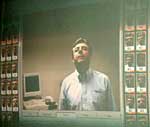Events may give boost to high-tech security firm
By Brandt Williams
Minnesota Public Radio
September 20, 2001
Last week's terror attacks and subsequent tightening of aviation security measures has brought attention to a Minnesota company that specializes in high-tech security products. Minnetonka-based Visionics makes equipment that can instantly identify people based on physical characteristics like fingerprints or facial features. Company officials claim that some of last week's tragedies could have been avoided had their devices been in use. However, some say concerns over cost and privacy may slow the implementation of such technology.
Had Visionics Sales and Marketing Vice President Barry Fisher been a wanted felon walking through an airport security checkpoint, officers would now be alerted to his presence.
At the company's Minnetonka office, Fisher demonstrates the software with a digital camera attached to a computer. In this demonstration, his captured image matches a picture of himself found in a test database of over 12,000 pictures. He says that even if he were walking in a crowd of people, in a matter of seconds his face would have been compared to thousands - or millions - of mugshots in a criminal database.
Visionics CEO Dr. Joseph Atick says the program converts faces into a mathematical formula called face print. "Which is unique to your identity and it's independent of the lighting, the viewing conditions, whether you have facial hair or not. And it's a measure of the relative relationships between the major landmarks of your face," he says.
Visionics is actually two companies that were joined earlier this year. Digital Biometrics, based in Minneapolis, combined with Visionics a private, New Jersey-based company which created the face-recognition program called Face-It.
Though Visionics is not the only company that makes this type of product, it has been inundated by inquiries and orders for its products since last Tuesday's terrorist attacks.
Market analyst Richard Ryan says the company is at the right place at the right time. "They've got commercial applications out there as well as military and government. So it's not like we're dealing with possible technology that might be scalable in six months. This technology is available today," Ryan says.
However, not everyone is enamored with face-recognition technology. Civil libertarians say that capturing images of faces in a crowd for security purposes is a potential invasion of privacy and fear that people's pictures will be stored and used without their knowledge.
But Visionics officials say the faces which don't match those in criminal databases are automatically discarded.
Richard Ryan says he doesn't think the privacy debate will keep the company from growing. "I think last week's events certainly put that argument to rest for the foreseeable future. And I think it certainly changes the landscape for this company going forward."
When the stock market reopened on Monday, the company's stock rose over 90 percent. Tuesday brought brought another slight increase. Visionics stock price declined by nearly six percent at the close of Wednesday's trading.
By Brandt Williams
Minnesota Public Radio
September 20, 2001
Last week's terror attacks and subsequent tightening of aviation security measures has brought attention to a Minnesota company that specializes in high-tech security products. Minnetonka-based Visionics makes equipment that can instantly identify people based on physical characteristics like fingerprints or facial features. Company officials claim that some of last week's tragedies could have been avoided had their devices been in use. However, some say concerns over cost and privacy may slow the implementation of such technology.
| |
|
|
|
||
At the company's Minnetonka office, Fisher demonstrates the software with a digital camera attached to a computer. In this demonstration, his captured image matches a picture of himself found in a test database of over 12,000 pictures. He says that even if he were walking in a crowd of people, in a matter of seconds his face would have been compared to thousands - or millions - of mugshots in a criminal database.
Visionics CEO Dr. Joseph Atick says the program converts faces into a mathematical formula called face print. "Which is unique to your identity and it's independent of the lighting, the viewing conditions, whether you have facial hair or not. And it's a measure of the relative relationships between the major landmarks of your face," he says.
Visionics is actually two companies that were joined earlier this year. Digital Biometrics, based in Minneapolis, combined with Visionics a private, New Jersey-based company which created the face-recognition program called Face-It.
Though Visionics is not the only company that makes this type of product, it has been inundated by inquiries and orders for its products since last Tuesday's terrorist attacks.
Market analyst Richard Ryan says the company is at the right place at the right time. "They've got commercial applications out there as well as military and government. So it's not like we're dealing with possible technology that might be scalable in six months. This technology is available today," Ryan says.
However, not everyone is enamored with face-recognition technology. Civil libertarians say that capturing images of faces in a crowd for security purposes is a potential invasion of privacy and fear that people's pictures will be stored and used without their knowledge.
But Visionics officials say the faces which don't match those in criminal databases are automatically discarded.
Richard Ryan says he doesn't think the privacy debate will keep the company from growing. "I think last week's events certainly put that argument to rest for the foreseeable future. And I think it certainly changes the landscape for this company going forward."
When the stock market reopened on Monday, the company's stock rose over 90 percent. Tuesday brought brought another slight increase. Visionics stock price declined by nearly six percent at the close of Wednesday's trading.

